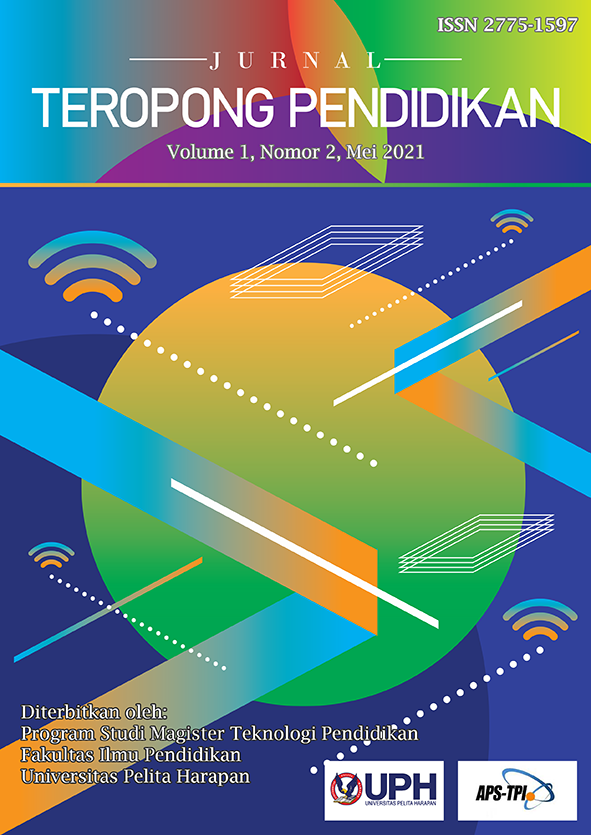HUBUNGAN ANTARA INTELIGENSI, KETERAMPILAN PERSEPSI VISUAL DENGAN PRESTASI BELAJAR MATEMATIKA SISWA [CORRELATION BETWEEN STUDENTS' INTELLIGENCE, VISUAL PERCEPTION SKILLS, AND MATHEMATICS LEARNING ACHIEVEMENT]
DOI:
https://doi.org/10.19166/jtp.v1i2.3461Keywords:
Intelligence, visual perceptual skills, mathematics’ learning achievementAbstract
Students’ mathematics achievement is the priority for the XYZ elementary school, but particularly in 2015 and 2016 school’s years, there was about 39% student who had poor mathematics achievement and didn’t pass the school’s minimum requirement. In most cases, student’s mathematics achievement is generally affected by two internal factors such as: student’s intelligence and visual perceptual skills. The aim of this research is to examine the relationship between intelligence, visual perceptual skills and the students’ mathematics achievement. The subject of this study were grade two and grade three students with the total sample of 43 pupils. This study employed the Test of Visual Perceptual Skills-third edition (TVPS-3) and the Culture-Fair Intelligence Test (CFIT). The results of this study showed that there was a positive and significant correlation between intelligence, visual perceptual skills and mathematics achievement. A correlation value of 0.664 was obtained for the relationship between intelligence and mathematics achievement. A correlation value of 0.723 was obtained for the relationship between visual perceptual skills and mathematics achievement and a correlation value of 0.903 was obtained for the relationship between intelligence and visual perceptual skills. These findings indicate that the higher the level of the student’s intelligence and visual perceptual skill, the higher their mathematics achievement too.References
Abid, H. C. (2006). Effect of guidance services on study attitudes, study habits and academic achievement of secondary school students. Bulletin of Education and Research, 28(1), 35-45. http://citeseerx.ist.psu.edu/viewdoc/download?doi=10.1.1.1046.1806&rep=rep1&type=pdf
Arifin, Z. (2011). Evaluasi pembelajaran: prinsip, teknik, prosedur. PT Remaja Rosdakarya.
Cassan, A. (2006). The senses: Inside the human body. Chelsea House Publisher.
Chamorro-Premuzic, T., & Furnham, A. (2008). Personality, intelligence and approaches to learning as predictors of academic performance. Personality and Individual Differences, 44(7), 1596-1603. https://doi.org/10.1016/j.paid.2008.01.003
Clutten, S. C. (2009). The development of a visual perceptual test for learners in the foundation phase. [Master’s thesis, University of South Africa]. Unisa Institutional Repository. http://uir.unisa.ac.za/bitstream/handle/10500/2613/thesis_clutten_s.pdf
Djamarah, S. B. (2002). Psikologi belajar. PT. Rineka Cipta.
Eysenck, M. W., & Keane, M. T. (2003). Cognitive psychology: A student’s handbook (4th ed.). Psychology Press Ltd.
Freeguard, L. S. (2014). Relationship between visual perceptual skill and mathematic ability. [Master’s thesis, University of South Africa]. Unisa Institutional Repository. http://uir.unisa.ac.za/handle/10500/14118
Gunderson, E. A., Ramirez, G., Beilock, S. L., & Levine, S. C. (2012). The relation between spatial skill and early number knowledge: The role of the linear number line. Developmental Psychology, 48(5), 1229-1241. https://doi.org/10.1037/a0027433
Kleiman, P. K. (2012). Psych 101: Psychology facts, basics, statistics, tests, and more! Adams Media.
Martin, N., & Gardner, M. F. (2006). Test of visual perceptual skills (3rd ed.). Academic Therapy Publications.
Moenikia, M., & Zahed-Babelan, A. (2010). A study of simple and multiple relations between mathematics attitude, academic motivation and intelligence quotient with mathematics achievement. Procedia - Social and Behavioral Sciences, 2(2), 1537-1542. https://doi.org/10.1016/j.sbspro.2010.03.231
Monks, F. J., Knoers, A. M. P., & Haditono, S. R. (2006). Psikologi perkembangan: pengantar dalam berbagai bagiannya. Gadjah Mada University Press.
Mushtaq, I., & Khan, S. N. (2012). Factors affecting students’ academic performance. Global Journal of Management and Business Research, 12(9). https://globaljournals.org/GJMBR_Volume12/3-Factors-Affecting-Students-Academic.pdf
Ormrod, J. E. (2011). Educational psychology: developing learners (6th ed.). Pearson.
Raychaudhuri, A. Debnath, M., Sen, S., & Majumder, B. G. (2010). Factors affecting students’ academic performance: A vase dtudy in Agartala Municipal Council Area. Bangladesh e-journal of Sociology, 7(2), 34-41. http://bangladeshsociology.org/BEJS%207.2%20-%20Factors%20Affecting%20Students.pdf
Santrock, J. W. (2011). Educational psychology (5th ed.). McGraw-Hill.
Thorndike, R. M. (1997). Measurement and evaluation in psychology and education (6th ed.). Prentice-Hall.
Tim Penyusun Kamus Pusat Bahasa. (2007). Kamus besar bahasa Indonesia (3rd ed.) Balai Pustaka.
Wade, N. J., & Swanston, M. (1991). Visual perception: An introduction. Routledge.
Wardle, F. (2003). Introduction to early childhood: A multidimensional approach to child-centered care and learning. Pearson.
Widyana, R. (2009). Uji validasi tes Frostig untuk mengukur kemampuan persepsi visual anak prasekolah di Yogyakarta. Psycho Idea, 7(2), 47-65. http://jurnalnasional.ump.ac.id/index.php/PSYCHOIDEA/article/view/192
Williams, C., Northstone, K., Sabates, R., Feinstein, L., Emond, A., Dutton, G. N. (2011). Visual perceptual difficulties and under-achievement at school in a large community-based sample of children. PLoS ONE, 6(3), 1-9. https://doi.org/10.1371/journal.pone.0014772
Winkel, W. S. (1986). Psikologi pendidikan dan evaluasi belajar. Gramedia.
Wortham, S. C. (2006). Early childhood curriculum: Developmental bases for learning and teaching (4th ed.). Pearson.
Yarmohammadian, A. (2014). The relationship between spatial awareness and mathematic disorders in elementary school students with learning mathematic disorder. Psychology and Behavioral Sciences, 3(1), 33-40. https://doi.org/10.11648/j.pbs.20140301.16
Downloads
Published
Issue
Section
License
Authors who publish with this journal agree to the following terms:
1) Authors retain copyright and grant the journal right of first publication with the work simultaneously licensed under a Creative Commons Attribution License (CC-BY-SA 4.0) that allows others to share the work with an acknowledgement of the work's authorship and initial publication in this journal.
2) Authors are able to enter into separate, additional contractual arrangements for the non-exclusive distribution of the journal's published version of the work (e.g., post it to an institutional repository or publish it in a book), with an acknowledgement of its initial publication in this journal.
3) Authors are permitted and encouraged to post their work online (e.g., in institutional repositories or on their website). The final published PDF should be used and bibliographic details that credit the publication in this journal should be included.







